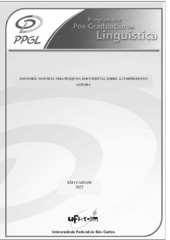Espanhol no ENEM: uma pesquisa documental sobre a compreensão leitora
Abstract
Considerando la historia de la enseñanza de la lengua española en Brasil y la apreciación de la lengua a partir de la Ley 11.161/2005, la inclusión de cuestiones de lengua en el ENEM-Examen Nacional de Enseñanza Media en 2010; considerando también la eliminación del español en la BNCC- Base Nacional Curricular Común y consecuentemente en el examen, previsto a partir de 2024, creemos importante investigar las evaluaciones anteriores de los años 2010 y 2021 con el objetivo de indagar qué es la comprensión lectora y el habilidades específicas que los estudiantes deben desarrollar en el clase para un mejor desempeño en la prueba ENEM. Las preguntas orientadoras de la investigación se basaron en la premisa: qué habilidades/estrategias específicas necesita el estudiante para tomar el examen de español y si los estudiantes de educación básica tienen el mismo concepto y habilidades requeridas. Para ello, utilizamos la metodología de carácter cualitativo-interpretativo, “El investigador busca comprender la complejidad de las cosmovisiones que surgen de la construcción social, la historia y la cultura” (CRESWELL, 2014), es decir, el investigador asume una postura interpretativa a través de los instrumentos preparados previamente-establecidos para la obtención de datos. En la investigación en mención, dicha interpretación se realizará con el análisis de los niveles de comprensión lectora de los estudiantes en lengua española, además del análisis interpretativo del nivel de comprensión lectora exigido en las preguntas del ENEM, a través de instrumentos como: análisis de documentos, además de formularios con textos extraídos de los exámenes ENEM de 2010 a 2021, y notas de campo de la investigadora. Los participantes de este estudio fueron 30 estudiantes de secundaria de una escuela técnica del interior de São Paulo, además de hojas de lectura con textos tomados de las pruebas ENEM de 2010 a 2021, y notas de campo de la investigadora. Analizamos las preguntas de dos ediciones del examen, la de 2010, que fue el año de inserción de la lengua española, y la de 2021, la última aplicación. En general, encontramos que el examen exige del candidato un amplio conocimiento del mundo y lectura diversa, con una concepción psicolingüística, además del uso de estrategias específicas, principalmente la inferencia por parte del estudiante (MARCUSCHI, 2008). Considering the history of Spanish language teaching in Brazil and the appreciation of the language from Law 11.161/2005, the inclusion of language questions in the ENEM- National Secondary School Examination in 2010; also considering the deletion of Spanish in the BNCC- Base Nacional Curricular Comum and consequently in the exam, scheduled from 2024, we believe it is important to research the previous evaluations of the years 2010 and 2021 with the objective of investigating what reading comprehension and the specific skills needed to be developed by students in the classroom for a better performance in the ENEM test. The research's guiding questions were based on the premise: what specific skills/strategies are needed by the student to take the Spanish test and whether basic education students have the same concept and required skills. For this, we use the methodology of a qualitative-interpretative nature, "The researcher seeks to understand the complexity of worldviews arising from the social construction, history and culture" (CRESWELL, 2014), that is, the researcher assumes an interpretive posture through the pre-prepared instruments. -established for obtaining data. In the research in question, such an interpretation will take place with the analysis of the students' levels of reading comprehension in the Spanish language, in addition to the interpretative analysis of the level of reading comprehension required in the ENEM questions, through instruments such as: document analysis, in addition to forms with texts taken from the ENEM exams from 2010 to 2021, and the researcher's field notes. The participants of this study were 30 high school students from a technical school in the interior of São Paulo, in addition to reading sheets with texts taken from the ENEM tests from 2010 to 2021, and the researcher's field notes. We analyzed the questions from two editions of the exam, that of 2010, which was the year of insertion of the Spanish language, and that of 2021, the last application. In general, we found that the exam demands from the candidate a wide knowledge of the world and diverse reading, with a psycholinguistic conception, also to the use of specific strategies, mainly the inference by the student (MARCUSCHI, 2008).
Collections
The following license files are associated with this item:

